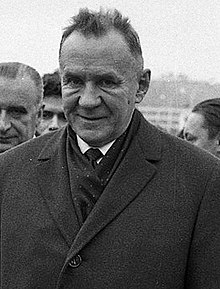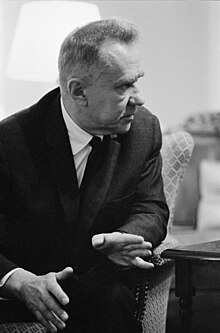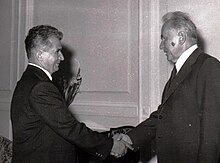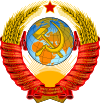Alexei Kosygin
Alexei Kosygin | |||||||||||||
|---|---|---|---|---|---|---|---|---|---|---|---|---|---|
Алексей Косыгин | |||||||||||||
 Kosygin in 1966 | |||||||||||||
| 8th Premier of the Soviet Union | |||||||||||||
| In office 15 October 1964 – 23 October 1980 | |||||||||||||
| President | Anastas Mikoyan Nikolai Podgorny Leonid Brezhnev | ||||||||||||
| Deputy |
| ||||||||||||
| Leader | Dmitriy Ustinov | ||||||||||||
| |||||||||||||
| Personal details | |||||||||||||
| Born | 21 February [ Conscript | ||||||||||||
| Commands | Red Army | ||||||||||||
| Battles/wars | Russian Civil War | ||||||||||||
Alexei Nikolayevich Kosygin (Russian: Алексе́й Никола́евич Косы́гин, IPA: [ɐlʲɪkˈsʲej nʲɪkɐˈla(j)ɪvʲɪtɕ kɐˈsɨɡʲɪn]; 21 February [O.S. 8 February] 1904 – 18 December 1980)[3] was a Soviet statesman during the Cold War. He served as the Premier of the Soviet Union from 1964 to 1980 and was one of the most influential Soviet policymakers in the mid-1960s along with General Secretary Leonid Brezhnev.
Kosygin was born in the city of
Stalin died in 1953, and on 20 March 1959, Kosygin was appointed to the position of chairman of the State Planning Committee (Gosplan), a post he would hold for little more than a year. Kosygin next became First Deputy chairman of the Council of Ministers. When Nikita Khrushchev was removed from power in 1964, Kosygin and Leonid Brezhnev succeeded him as Premier and First Secretary, respectively. Thereafter, as a member of the collective leadership, Kosygin formed an unofficial Triumvirate (also known by its Russian name Troika) alongside Brezhnev and Nikolai Podgorny, the Chairman of the Presidium of the Supreme Soviet, that governed the Soviet Union in Khrushchev's place.
During the initial years following Khrushchev's ouster, Kosygin initially emerged as the leading figure in Soviet politics.[4][5][6] In addition to managing the Soviet Union's economy, he assumed a preeminent role in its foreign policy by leading arms control talks with the US and overseeing relations with other communist countries. However, the onset of the Prague Spring in 1968 sparked a severe backlash against his policies, enabling Brezhnev to eclipse him as the dominant force in the Politburo. While he and Brezhnev disliked one another, he remained in office until being forced to retire on 23 October 1980, due to bad health. He died two months later on 18 December 1980.
Early life
Kosygin was born into a
He and his father sympathized with the
Early career
Pre-war period
He applied for a membership in the
Wartime
Kosygin was appointed by the
As deputy chairman of the Council of Evacuation,[14] he had the task of evacuating industry from territories about to be overrun by the Axis. Under his command 1523 factories were evacuated eastwards, as well as huge volumes of raw materials, ready-made goods and equipment. Kosygin managed clearing of congestions on the railroads in order to maintain their stable operation.[15]
During the
In 1943 Alexey Kosygin was promoted to
Afterwar period
Kosygin became a candidate member of the
Kosygin's administrative skills[17] led Stalin to take the younger man under his wing. Stalin shared information with Kosygin, such as how much money the families of Vyacheslav Molotov, Anastas Mikoyan, and Lazar Kaganovich possessed, spent and paid their staff. (A Politburo member earned a modest salary by Soviet standards[18] but enjoyed unlimited access to consumer goods.) Stalin sent Kosygin to each home[when?] to put their houses into "proper order".
Temporary fall
Kosygin's patron, Zhdanov, died suddenly in August 1948. Soon afterwards, Zhdanov's old rivals Lavrentiy Beria and Georgy Malenkov persuaded Stalin to let them remove members of the decapitated Zhdanov faction, of whom the three most prominent were Nikolai Voznesensky, then Chairman of the State Planning Committee and a First Deputy Premier, Alexey Kuznetsov, the party secretary with oversight over the security, and Kosygin. During the brutal purge that followed, known as the Leningrad affair, Voznesensky, Kuznetsov and many others were arrested and shot. Kosygin was relegated to the post of USSR Minister for Light Industry,[19] while nominally retaining his membership of the Politburo until 1952.[20]

Nikita Khrushchev wrote in his memoirs:
Beria and Malenkov were doing everything they could to wreck this troika of Kuznetsov, Voznesensky and Kosygin ... Many people perished in Leningrad. So did many people who had been transferred from Leningrad to work in other regions. As for Kosygin, his life was hanging by a thread ... Men who had been arrested and condemned in Leningrad made ridiculous accusations against him ... I simply can't explain how he was saved from being eliminated along with the others. Kosygin, as they say, must have drawn a lucky lottery ticket.[21]
Kosygin told his son-in-law Mikhail Gvishiani, an NKVD officer, of the accusations leveled against Voznesensky because of his possession of firearms. Gvishiani and Kosygin threw all their weapons into a lake and searched both their own houses for any listening devices. They found one at Kosygin's house, but it might have been installed to spy on Marshal Georgy Zhukov, who had lived there before him. According to his memoirs, Kosygin never left his home without reminding his wife what to do if he did not return from work. After living two years in constant fear, the family reached the conclusion[when?] that Stalin would not harm them. [22]
Khrushchev era
In September 1953, six months after Stalin's death, Kosygin was appointed USSR Minister for Industrial Goods, and in December he was reinstated as a Deputy Chairman of the Council of Ministers, under Malenkov, Stalin's immediate successor, but lost that position in December 1956, during Khrushchev's ascendancy, when he was appointed Deputy Chairman of the State Economic Commission. When the power struggle between Khrushchev and the so-called 'Anti-Party Group' came to a head in 1957, Kosygin backed Khrushchev because, as he said later, if Malenkov and his allies had won "blood would have flowed again",[23] but the French journalist Michel Tatu, a close observer who was based in Moscow at the time, concluded that "Kosygin did not owe anything to Khrushchev" and that out of the post-1957 leadership "was visibly the least willing to praise the First Secretary", and that Khrushchev was "somewhat reluctant" to promote Kosygin.[24]
However, despite Khrushchev's reluctance, Kosygin's career made a steady recovery. In June 1957, he was again appointed a Deputy Chairman of the Council of Ministers (for the third time), and a candidate member of the Presidium Central Committee (the renamed Politburo). In March 1959, he was made Chairman of Gosplan, and on 4 May 1960, he was promoted First deputy Chairman of the Council of Ministers, and a full member of the Presidium.[25]
As First Deputy Premier Kosygin travelled abroad, mostly on trade missions, to countries such as North Korea, India, Argentina and Italy. Since 1959 Kosygin headed Soviet mission to the ComEcon. Later, in the aftermath of the Cuban Missile Crisis, Kosygin was the Soviet spokesman for improved relations between the Soviet Union and the United States.[19] According to Michel Tatu, in 1960–62, Kosygin was one of the 'big four', with Khrushchev, Frol Kozlov and Leonid Brezhnev, who would be present in the Kremlin to greet visiting leaders of East European communist parties, implying, but in November 1962, after Khrushchev complained about the management of Gosplan, and opposed Kosygin's plans for economic reform, he was removed from the inner leadership.[26]
Premiership
Struggle for power with Brezhnev

When Khrushchev was removed from power in October 1964,[27] Kosygin replaced him as Premier in a collective leadership that included Leonid Brezhnev as general secretary and Nikolai Podgorny who ultimately became Chairman of the Presidium.[28] Overall, the new Politburo adopted a more conservative outlook than that under Khrushchev's rule.
Kosygin, Podgorny and
In October 1964, at a ceremony in honour of Soviet cosmonauts, Brezhnev called for the strengthening of the Party apparatus. This speech was only the beginning of a large campaign directed against Kosygin. Several newspapers, such as Pravda and Kommunist, criticized the work of the Council of Ministers, and indirectly Kosygin, its chairman, for planning the economy in an unrealistic fashion, and used the highly aggressive rhetoric previously used to condemn Khrushchev against Kosygin.[citation needed]
Brezhnev was able to criticize Kosygin by contrasting him with
Early during Kosygin's tenure, the Brezhnev–Kosygin attempt to create stability was failing on various fronts. From 1969 to 1970, discontent within the Soviet leadership had grown to such an extent that some started to doubt both former and current Soviet policies. Examples include the handling of the
By 1970, these differences had not been resolved, and Brezhnev postponed the
Foreign policy

Early on in his tenure, Kosygin challenged Brezhnev's right as

Kosygin developed a close friendly relationship with the President of Finland Urho Kekkonen, which helped the USSR to maintain active mutual trade with Finland and to keep it away from Cold War confrontation.[40]
In 1972, Kosygin signed a Treaty of Friendship and Cooperation with the government of
Kosygin protected
We should tell Taraki and Amin to change their tactics. They still continue to execute those people who disagree with them. They are killing nearly all of the Parcham leaders, not only the highest rank, but of the middle rank, too.
— Kosygin speaking at a Politburo session.[45]
Kosygin acted as a mediator between
The
During an official visit by an Afghan delegation, Kosygin and
Economic policy
Five-Year Plans
The
The
The "Kosygin" reform
Like Khrushchev, Kosygin tried to reform the
The reform was influenced by the works of Soviet economist

Kosygin believed that decentralization,
Results
The salary for Soviet citizens increased abruptly by almost 2.5 times during the plan. Real wages in 1980 amounted to 232.7 rubles, compared to 166.3 rubles before the 1965 Soviet economic reform and the Eighth Five-Year Plan. The first period, 1960–1964, was characterized by low growth, while the second period, 1965–1981, had a stronger growth rate. The second period vividly demonstrated the success of the Kosygin reform, with the average annual growth in retail turnover being 11.2 billion rubles, 1.8 times higher than in the first period and 1.2 times higher than the third period (1981–1985). Consumption of goods and daily demand also increased. The consumption of home appliances greatly increased. Refrigerators increased from a low of 109,000 in 1964 to 440,000 units by 1973; consumption declined during the reversal of the reform. Car production increased, and would continue to do so until the late 1980s. The Soviet leadership, under pressure, sought to provide more attractive goods for Soviet consumers.[60]
The removal of Khrushchev in 1964 signalled the end of his "
Cancellation and aftermath
Growing hostility towards reform, the initial poor results, and Kosygin's reformist stance, led to a popular backlash against him. Kosygin lost most of the privileges he had enjoyed before the reform, but Brezhnev was never able to remove him from the office of Chairman of the Council of Ministers, despite his weakened position.
1973 and 1979 reforms
Kosygin initiated another
Later life and resignation

By the early to mid-1970s Brezhnev had established a strong enough power base to effectively become leader. According to historian Ilya Zemtsov, the author of Chernenko: The Last Bolshevik: The Soviet Union on the Eve of Perestroika, Kosygin "began to lose power" with the 24th Party Congress in 1971 which for the first time publicized the formula 'the Politburo led by Brezhnev'". Along with weakening Kosygin's position, Brezhnev moved to strengthen the Party's hold on the Government apparatus, weakening Kosygin's position further.[65] Historian Robert Wesson, the author of Lenin's Legacy: The Story of the CPSU, notes that Kosygin's economic report to the 25th Party Congress "pointed even more clearly to the end of struggle" between Brezhnev and Kosygin.[55] Kosygin was further pushed aside when Brezhnev published his memoirs, which stated that Brezhnev, not Kosygin, was in charge of all major economic decisions.[66] To make matters worse for Kosygin, Brezhnev blocked any future talks on economic reform within the party and government apparatus, and information regarding the reform of 1965 was suppressed.[55]
Brezhnev consolidated his own position over the Government Apparatus by strengthening Podgorny's position as
Brezhnev's consolidation of power weakened Kosygin's influence and prestige within the Politburo. Kosygin's position was gradually weakened during the 1970s and he was frequently hospitalized.
Death

Kosygin was hospitalized in October 1980; during his stay he wrote a brief letter of resignation; the following day he was deprived of all government protection, communication, and luxury goods he had earned during his political life. Kosygin died on 18 December 1980 in Moscow, none of his Politburo colleagues, former aides, or security guards visited him. At the end of his life, Kosygin feared the complete failure of the
Personality
Compared to other Soviet officials, Kosygin stood out as a pragmatic and relatively independent leader. In a description given by an anonymous high-ranking
Canadian Prime Minister
Legacy
Historical assessments
Kosygin would prove to be a very competent administrator, with the Soviet
Chernenko: The Last Bolshevik: The Soviet Union on the Eve of Perestroika author Ilya Zemtsov describes Kosygin as "determined and intelligent, an outstanding administrator" and claims he distinguished himself from the other members of the Soviet leadership with his "extraordinary capacity for work".[77] Historians Moshe Lewin and Gregory Elliott, the authors of The Soviet Century, describe him as a "phenomenal administrator".[16] "His strength", David Law writes, was "his exceptional capability as an administrator". According to Law Kosygin proved himself to be a "competent politician" also.[7] Historians Evan Mawdsley and Stephen White claim that Brezhnev was unable to remove Kosygin because his removal would mean the loss of his last "capable administrator".[78] In their book, The Unknown Stalin, Roy Medvedev and Zhores Medvedev called Kosygin an "outstanding organizer", and the "new Voznesensky".[17] Historian Archie Brown, the author The Rise & Fall of Communism, believes the 1965 Soviet economic reform to have been too "modest", and claimed that Kosygin "was too much a product of the Soviet ministerial system, as it evolved under Stalin, to become a radical economic reformer". However, Brown does believe that Kosygin was "an able administrator".[5] Gvishiani, a Russian historian, concluded that "Kosygin survived both Stalin and Khrushchev, but did not manage to survive Brezhnev."[2]
Kosygin was viewed with sympathy by the Soviet people, and is still presently viewed as an important figure in both Russian and Soviet history.
Honours
During his lifetime, Kosygin received seven Orders and two Awards from the Soviet state.
Foreign honours
- Bangladesh Liberation War Honour(Bangladesh Muktijuddho Sanmanona)
References
- ^ Law 1975, p. 214.
- ^ a b c d Алексей Гвишиани: "Не надо жалеть Косыгина!" [Alex Gvishiani: "Do not feel sorry for Kosygin!"] (in Russian). Pravda Online. 9 April 2004. p. 3. Retrieved 4 September 2010.
- ISBN 978-1851098422.
- ISBN 978-0-8078-5958-2.
- ^ a b c d Brown 2009, p. 403.
- ISBN 0582-01323-2.
- ^ a b Law 1975, p. 221.
- ^ Андриянов, Виктор (23 August 2003). Неизвестный Косыгин [The Unknown Kosygin]. Rossiyskaya Gazeta (in Russian). Retrieved 4 September 2010.
- ^ )
- ^ Society for Contemporary Studies 1979, p. 15.
- ^ a b c d e Law 1975, p. 222.
- ^ Safire 1988, p. 610.
- ^ a b Алексей Николаевич Косыгин [Alexei Nikolayevich Kosygin] (in Russian). Moscow State Textile University. 27 November 2008. Archived from the original on 10 August 2010. Retrieved 5 September 2010.
- ^ a b c d Алексей Гвишиани: "Не надо жалеть Косыгина!" [Alex Gvishiani: "Do not feel sorry for Kosygin!"] (in Russian). Pravda Online. 9 April 2004. Archived from the original on 11 August 2010. Retrieved 4 September 2010.
- ^ a b c RBTH; Timofeychev, Alexey (24 November 2016). "The Soviet statesman who had the talent to be boss of Ford or GM". www.rbth.com. Retrieved 18 December 2019.
- ^ a b c d Elliott & Lewin 2005, p. 248.
- ^ a b c Z. Medvedev & R. Medvedev 2006, p. 48.
- ^ Elliott & Lewin 2005, p. 95.
- ^ a b "Suddenly Nikita's day was done". Life. 23 October 1964. p. 35.
- ISBN 0-8014-1410-5.
- ^ Khrushchev, Nikita (1971). Khrushchev Remembers. London: Sphere. pp. 222, 225.
- ^ Elliott & Lewin 2005, p. 96.
- ISBN 0-7432-7564-0.
- ^ Tatu 1969, pp. 93–94.
- ^ Conquest, Robert (1961). Power and Policy in the U.S.S.R. London: Macmillan. pp. 384, 387.
- ^ Tatu 1969, pp. 284–288.
- ^ Service 2009, p. 377.
- ^ Brown 2009, p. 402.
- ^ a b c d e Law 1975, p. 211.
- ^ Zemtsov 1989, p. 86.
- ^ Zemtsov 1989, p. 102.
- ^ Zemtsov 1989, p. 103.
- ^ Wesson 1978, p. 248.
- ^ a b van Dijk 2008, p. 525.
- ^ Gibbons 1995, pp. 718–719.
- ^ Robbins 2010, p. 73.
- ^ Dannenberg 2008, p. 33.
- ISSN 0362-4331. Retrieved 18 December 2019.
- ^ Church, Frank (1971). Interview with Kosygin: Report to the Committee on Foreign Relations, United States Senate. U.S. Government Printing Office.
- ^ "Pääministeri Aleksei Kosygin oli suomalaisille tutuin neuvostojohtaja – Moskova kielsi Kekkoselta viimeisen tapaamisen". Helsingin Sanomat (in Finnish). 23 April 2017. Retrieved 18 December 2019.
- ^ Coughlin 2005, p. 106.
- ^ Service 2009, p. 385.
- ^ Service 2009, p. 386.
- ^ Service 2009, p. 388.
- ^ Harrison & Cordovez 1995, pp. 36–37.
- ^ a b Zubok 2007, pp. 194–195.
- ^ Colman 2004, p. 125.
- ^ Brown 2009, pp. 352–353.
- ^ Brown 2009, p. 354.
- ^ Прямые инвестиции / № 9 (89) 2009. А. Милюков. О причинах кризиса.
- ^ Daniels 2004, p. 65.
- ^ Daniels 1993, p. 302.
- ^ Rutland 1985, p. 137.
- ^ Ploss 2010, p. 171.
- ^ a b c Wesson 1978, p. 253.
- ^ a b Moss 2005, p. 431.
- ^ a b Chauhan 2004, p. 207.
- ^ Wesson 1978, p. 240.
- ^ Elliott & Lewin 2005, p. 249.
- ^ Анализ динамики показателей уровня жизни населения [Analysis of the dynamics of living standards] (in Russian). Moscow State University. Retrieved 4 September 2010.
- ^ a b Травин, Дмитрий. Алексей Николаевич Косыгин [Alexei Nikolayevich Kosygin] (in Russian). peoples.ru. Retrieved 20 September 2010.
- ^ Bacon & Sandle 2002, p. 58.
- ^ Dellenbrant 1986, pp. 74–75.
- ^ ютуба, любитель (17 December 2010). "30 лет назад умер Алексей Косыгин" [A reformer before Yegor Gaidar? Kosygin died for 30 years ago]. Newsland (in Russian). Retrieved 29 December 2010.
- ^ a b c Zemtsov 1989, p. 119.
- ^ Wesson 1978, p. 254.
- ^ Zemtsov 1989, p. 118.
- ^ a b "Soviet Union: And Then There Was One". Time. 3 November 1980. Archived from the original on 25 November 2010. Retrieved 21 January 2011.
- ^ a b Zemtsov 1989, p. 105.
- ^ Вергасов, Фатех. Организация здорового накала [The Healthy Glow of Organisation] (in Russian). pseudology.org. Retrieved 4 September 2010.
- ^ "World: Lonely Death of a Survivor". Time. 29 December 1980. p. 1. Archived from the original on 21 May 2008. Retrieved 21 January 2011.
- ^ Saikal 2006, p. 293.
- ^ Bothwell & Granatstein 1991, p. 193.
- ^ "World: Lonely Death of a Survivor". Time. 29 December 1980. p. 2. Archived from the original on 21 May 2008. Retrieved 21 January 2011.
- OCLC 836400972.
- )
- ^ Zemtsov 1989, pp. 86–87.
- ^ a b Mawdsley & White 2000, p. 272.
- ^ Ellman 1989, p. 73.
- ^ a b Staff writer. Косы́гин, Алексе́й Никола́евич [Kosygin, Alexei Nikolayevich] (in Russian). warheroes.ru. Retrieved 18 April 2011.
- ^ Central Asian Research Centre 1979, p. 64.
Sources
- ISBN 978-0-224-07879-5.
- Bacon, Edwin; Sandle, Mark (2002). Brezhnev Reconsidered. ISBN 978-0333794630.
- Bothwell, Robert; Granatstein J.L. (1991). Pirouette: Pierre Trudeau and Canadian Foreign Policy. ISBN 978-0802057808.
- Central Asian Research Centre (1979). USSR and Third World. Vol. 8. Indiana University: Central Asian Research Centre.
{{cite book}}: CS1 maint: ref duplicates default (link) - Chauhan, Sharad (2004). Inside CIA: Lessons in Intelligence. APH Publishing. ISBN 9788176486606.
- Colman, Jonathan (2004). A 'special relationship'?: Harold Wilson, Lyndon B. Johnson and Anglo-American relations 'at the summit', 1964–68. ISBN 0719070104.
- ISBN 978-0060505431.
- ISBN 978-0874516166.
- OCLC 1033575049.
- Dannenberg, Julia von (2008). The Foundations of Ostpolitik: The Making of the Moscow Treaty between West Germany and the USSR. ISBN 978-0199228195.
- Dellenbrant, Jan Åke (1986). The Soviet Regional Dilemma: Planning, People, and Natural Resources. ISBN 978-0873323840.
- Elliott, Gregory; Lewin, Moshe (2005). The Soviet Century. London; New York: ISBN 978-1844670161.
- ISBN 978-0521358668.
- ISBN 978-0691006352.
- Harrison, Selig S.; Cordovez, Diego (1995). Out of Afghanistan: the Inside Story of the Soviet Withdrawal. New York: ISBN 978-0195062946.
- Law, David A. (1975). Russian Civilization. New York: Ardent Media. ASIN B003RXSA90.
- Mawdsley, Evan; ISBN 978-0198297383.
- Medvedev, Zhores; Medvedvev, Roy (2006). The Unknown Stalin. London: ISBN 978-1585675029.
- Moss, Walter (2005). A History of Russia: Since 1855. London: Anthem Press. ISBN 978-1-84331-034-1.
- Ploss, Sidney (2010). The Roots of Perestroika: The Soviet Breakdown in Historical Context. ISBN 978-0786444861.
- Robbins, James (2010). This Time We Win: Revisiting the Tet Offensive. ISBN 978-1594032295.
- Rutland, Peter (1985). ISBN 978-0812690057.
- Safire, William (1988). Before the Fall: An Inside View of the Pre-Watergate White House. ISBN 978-0-306-80334-5.
- Saikal, Amin (2006). Modern Afghanistan: a History of Struggle and Survival. ISBN 978-1850434375.
- ISBN 978-0141037974.
- Society for Contemporary Studies (1979). The Contemporary. Vol. 23. New Delhi: R.N. Guha Thakurta for Contemporary Journals Ltd. )
- van Dijk, Ruud (2008). Encyclopedia of the Cold War. Vol. 2 (1st ed.). Routledge. ISBN 978-0415975155.
- Tatu, Michel (1969). Power in the Kremlin: from Khrushchev to Kosygin. New York: Viking Press. ISBN 9780670570287.
- Wesson, Robert G. (1978). Lenin's Legacy: The Story of the CPSU. Stanford, Calif: ISBN 978-0817969226.
- Zemtsov, Ilya (1989). Chernenko: The Last Bolshevik: The Soviet Union on the Eve of Perestroika. ISBN 978-0887382604.
- Zubok, Vladislav Martinovich (2007). A Failed Empire: the Soviet Union in the Cold War from Stalin to Gorbachev. ISBN 978-0807830987.
External links
 Media related to Alexei Kosygin at Wikimedia Commons
Media related to Alexei Kosygin at Wikimedia Commons

